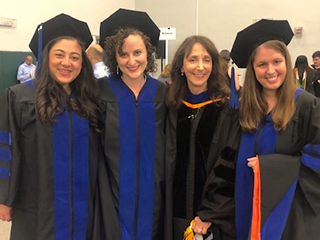 “Pediatric Health Clinical is specifically geared toward students who have strong research interests in child health psychology. Its students have many of the same course and practicum requirements as students in Child/Family Clinical (see Child/Family Clinical description). However, pediatric health students focus on research experiences with pediatric or health-related populations and have greater exposure to coursework and practicum experiences with pediatric populations. All students begin research activities with pediatric populations during their first year.
“Pediatric Health Clinical is specifically geared toward students who have strong research interests in child health psychology. Its students have many of the same course and practicum requirements as students in Child/Family Clinical (see Child/Family Clinical description). However, pediatric health students focus on research experiences with pediatric or health-related populations and have greater exposure to coursework and practicum experiences with pediatric populations. All students begin research activities with pediatric populations during their first year.
At the time of entry to the program, and each semester thereafter, students work closely with an individual faculty member on research. A mentor-apprentice model is utilized, with students gradually increasing in independence in research skills and responsibilities. Therefore, when applying, applicants are encouraged to prepare personal statements that specifically describe their research interests and goals. Because of our mentoring system, it is extremely helpful for applicants to indicate specific faculty members whose research interests match their own.
The heart of our graduate training is close research mentorships. Students and faculty mentors work together closely, meeting regularly to discuss research and professional issues, as well as student career development. There are also a variety of social events hosted by both students and faculty members.
Information about student funding - click to view Clinical Program Data
- Students in our program who are in good standing typically have full tuition remission and remuneration.
- About half of the students are funded with Research Assistantships in which funding is provided from a specific faculty mentor's research grant.
- Teaching Assistantships provide students with undergraduate teaching opportunities.
- Students typically begin by assisting faculty members teaching courses. Students are also required to teach one course at some point during their graduate studies in order to prepare them for university employment.
- About 20% of our students are funded on competitive fellowships, such as the University Fellowships provided by the University of Miami.



 “Pediatric Health Clinical is specifically geared toward students who have strong research interests in child health psychology. Its students have many of the same course and practicum requirements as students in Child/Family Clinical (see
“Pediatric Health Clinical is specifically geared toward students who have strong research interests in child health psychology. Its students have many of the same course and practicum requirements as students in Child/Family Clinical (see 